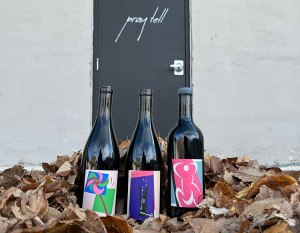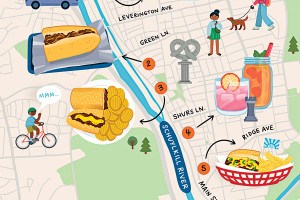Meet the Chef Creating Philadelphia’s Most Epic Dinner Series
After 100 episodes of Chef Radio Podcast, chef Eli Kulp has created a vast network of restaurant industry titans. Now he's bringing them together in a collaborative dining experience you won't want to miss.
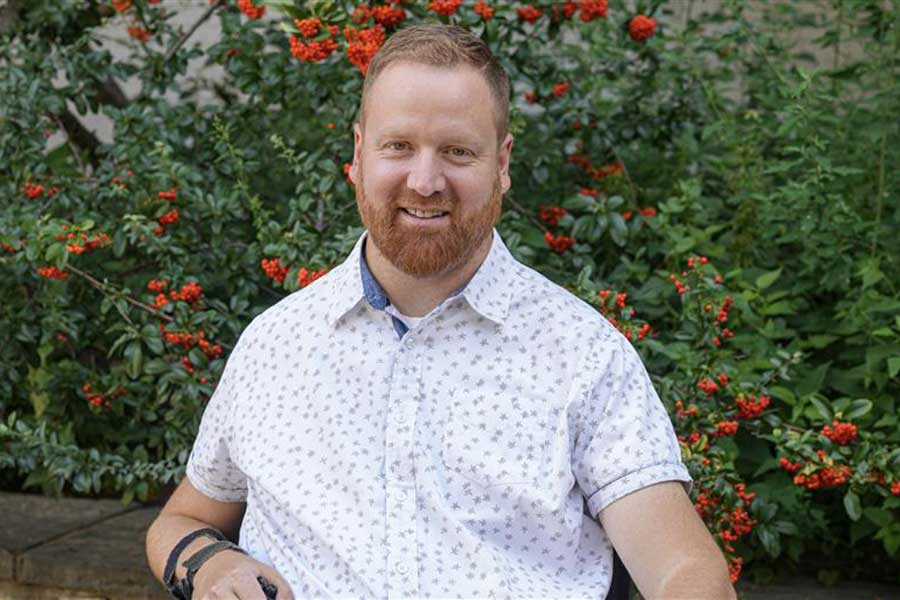
Chef Eli Kulp is hosting a new dinner series, bringing two top chefs together for unforgettable meals. / Photograph by Mike Prince
Behind the Line is Foobooz’s interview series with the people who make up Philly’s dynamic food and beverage scene. For the complete archives, go here.
According to chef Eli Kulp, what separates good chefs from great chefs goes beyond the plate. It’s all about connection. When you cultivate the ability to connect with other chefs, your own experiences and ambitions, and the community you’re serving, it will inevitably translate into excellent food.
Kulp’s own career has been a series of moments connecting, disconnecting and reconnecting with his own form of greatness. In 2014, Kulp was named Food & Wine’s Best New Chef, and High Street Market was recognized as the second-best restaurant in the country according to Bon Appétit. But in May 2015, when his Amtrak train derailed, Kulp became paralyzed. In the years that followed, Kulp struggled to rediscover his identity as a chef, eventually turning to podcasting as a way of tapping back into his ambitions.
Today, Kulp continues his exploration of greatness as the host of two podcasts (Delicious City and the Chef Radio Podcast), as a partner of High Street Hospitality Group, and as an all-around collaborator and mentor connecting with chefs in Philadelphia and beyond.
After 100 episodes of Chef Radio Podcast, Kulp has created a large network of the country’s top chefs, and is inviting listeners to experience their food IRL through his new Voi-Age Dinner Series. Each event in the series will bring together two top chefs — one from Philadelphia and one from another city – to create a once-in-a-lifetime dining experience. The series kicks off at Kalaya on October 16th and 17th where Philly’s own Chutatip “Nok” Suntaranon will be cooking with Justin Pichetrungsi of Anajak Thai Cuisine in Los Angeles; both chefs, by the way, are this year’s James Beard Award-winners for Best Chef Mid-Atlantic and Best Chef California, respectively. Future dinners in the series will feature Michael Solomonov, Greg Vernick, and Nick Elmi. The Voi-Age Dinner Series also aims to make a $10,000 donation to causes significant to each participating chef. For the first installment, Kalaya will be donating to Philadelphia’s Liguori Academy.
I recently had a call with Kulp to learn more about what inspired the Voi-Age Dinner Series. We ended up having an inspiring and thought-provoking conversation about what drives chefs toward excellence, the meaning of accolades, and his journey from making teriyaki chicken salad at a small restaurant in rural Washington state to becoming one of Philadelphia’s most important voices and collaborators in the industry.
I was born in … a small town in Washington state called Mossyrock. It’s a town of about 500 people. It’s really rural.
I got inspired to cook … at a place called the Irish Rose Cafe. I worked there from 14 to when I graduated high school at 18. I can still remember the night when it all started. Every year, we had the Rod Run where hot rod cars would come to town for a weekend. I was just a busboy and dishwasher, but that night — it was a Friday night — there was a lot of prep to do. I got a chance to make teriyaki chicken for a salad. It was basically braising chicken breast with soy sauce, sugar, some celery and peanuts. To a 14-year-old in rural Washington, it was very exotic. That was the moment that I had caught the bug.
The moment I knew Philly’s food scene was different when … I came to Philadelphia about 10 years ago. It was really important for me to reach out to chefs early on — to meet them, to understand who they were. It was really important for me to come to Philadelphia humble and hungry. And I noticed that people support each other here. Over the years I’ve seen this collaborative spirit that Philly has, which is indicative of a city that has a healthy and robust dining scene. It makes a difference to young chefs coming up in the business, knowing that they have full support from the people who they consider to be peers now, but at one point were their mentors or their idols. All of a sudden, you get to hang out with Marc Vetri, Greg Vernick or Nick Elmi. And they treat you like you’re one of them. That makes a huge difference — giving these young chefs the courage and the faith that they’re doing something right. I think that’s just one aspect of why Philadelphia’s food scene has continued to grow.
My goal has always been … to cook really delicious food first and foremost. But my ambitions didn’t just stop there. I always put this emphasis on being relevant. What I mean by relevant: It’s not to gain accolades; it’s to know that you’re adding something new, you’re creating something new and different — something that adds to the conversation that pushes the narrative of our industry forward.
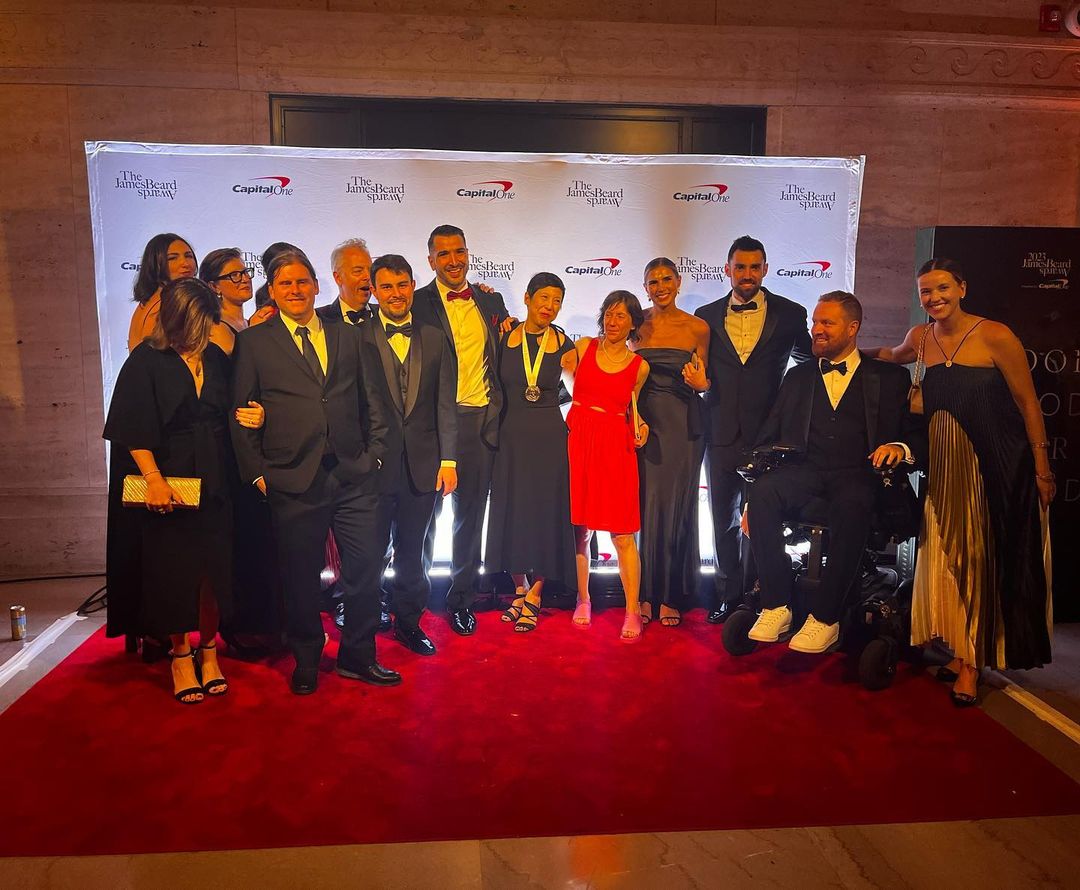
Eli Kulp and High Street Hospitality Group after Ellen Yin won the James Beard Award for Outstanding Restauranteur. / Photograph courtesy of Eli Kulp
Accolades play a part in the success of a business but … they should never be what’s driving you. If that’s the case, then you’re building your house on sand, and you’re going to be disappointed. I think anytime that you’re doing something novel or different, and it is being recognized, that is just affirmation that you are on the right path that you are — that your language of food is striking a chord with people.
The most important moment in a chef’s career … is when you create your own language with food. What I mean by that is that your point of view — the culmination of all the chefs you’ve worked for, all the energy, all the work that you’ve done, adds up to something unique and adds to the landscape of the industry. Not every chef has that. A lot of chefs will just regurgitate a blend of everything they’ve done. And while it might be something different, it doesn’t create something new to talk about.
I got injured … within the same calendar year of winning Food & Wine Best New Chef, and all these other accolades for High Street Hospitality Group, we were on a roll. We reopened Fork, we opened High Street which got second-best restaurant in the country from Bon Appétit. We took over A.Kitchen, which was doing some really cool things. We had really big ambitions and we knew that we had this moment in time that we had to really capitalize on because it’s fleeting. You have to take advantage of them if you want to stand out in our industry because it’s hard to succeed. It was this moment in time we were working towards, gaining everything we could from it, and then the injury happened.
When I was injured … it was like my hands were cut off. Like, my hands, my legs essentially. I didn’t know the extent of my injuries. I knew I couldn’t move. I knew I was paralyzed pretty much immediately. I didn’t know if I was bleeding. I didn’t know if I was dying. The first thing I thought about was my family, and then it was my career, because just like artists, often the best ones are the most obsessed. Being obsessed with what I did as a chef — those two things, my family and my career, are sometimes equal in my head. Because I had worked and strived so much — I sacrificed so much. You think of all the holidays, events, all the family moments you miss as a chef. This is for all creatives, this is for other industries as well, that you put a lot of sacrifice in if you want to be relevant in your industry
But that moment of realizing that I couldn’t do what I wanted to do my whole life. And knowing that I couldn’t be a part of everything that we had put in place together at High Street Hospitality Group. Afterward, I found a great psychologist that worked with people with spinal cord injury that helped me see what’s possible. But I still struggled thinking about What am I going to do with myself? How will I spend my time? How do I best use my skill set still?
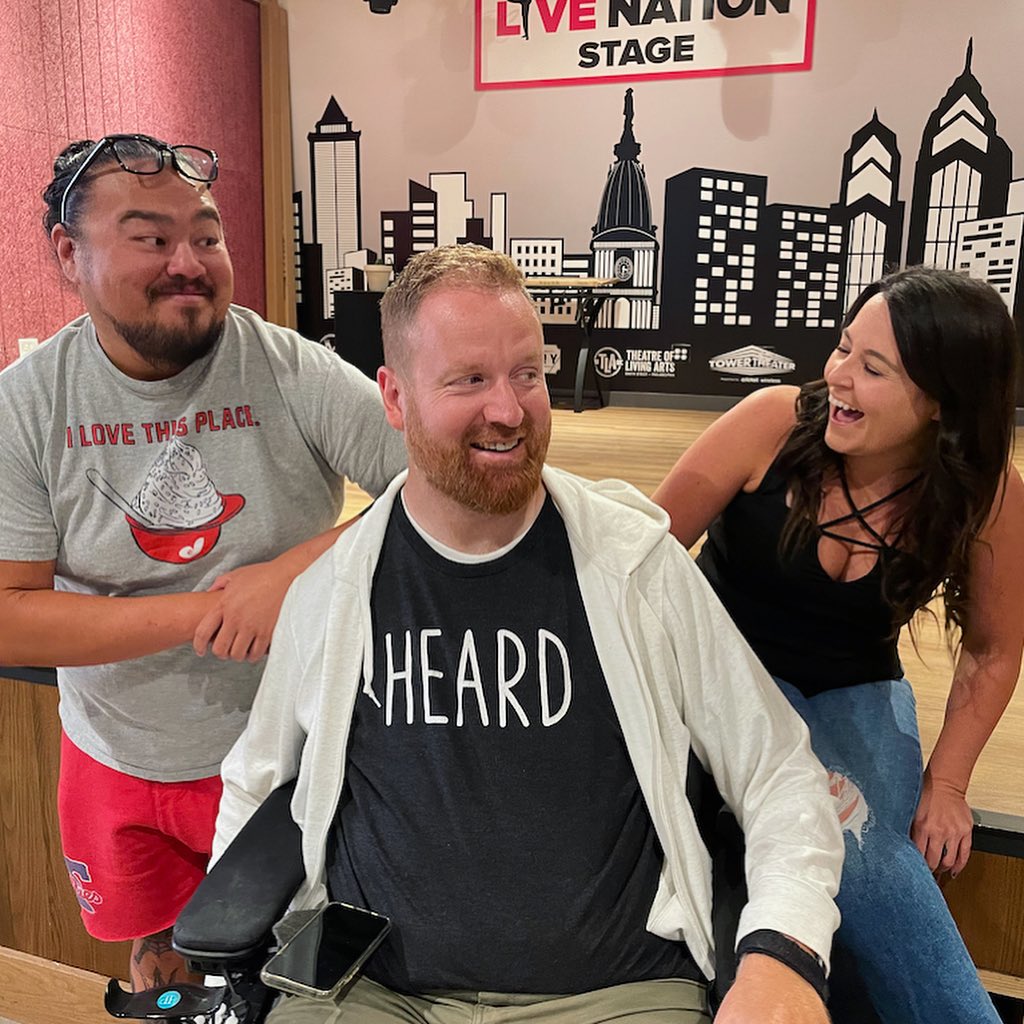
Eli Kulp with Delicious City co-hosts David Wesolowski and Marisa Magnatta. / Photograph courtesy of Eli Kulp
Podcasting became an outlet for me to stay ambitious and relevant by … helping my industry through telling stories and creating a media platform that can help individuals who are aspiring to be chefs. I’m still able to mentor people, but through a different way. Chef Radio Podcast is built for culinary professionals who want insight into the minds of chefs. I say that in the intro of every podcast. Because if I had this when I was coming up as a young chef, where I could hear other chefs speak about their vulnerabilities, about their challenges and their failures — it’s one thing to hear about somebody’s success, but it’s so much more empowering in a strange way to hear about people’s failures. Because you can relate.
I started the Voi-Age Dinner Series for … selfish reasons. It’s a way for me to connect to the listener. Because podcasting is a one-way street. The only opportunities I have to connect with listeners face-to-face is with our podcast events. So selfishly, it’s like I’m saying, I would love to see Nok cook with Justin to create an incredible dinner, so let’s see if we can make that happen.
The Voi-Age Dinner Series is about … stepping up that spirit of collaboration that you see around the city. We’re leveling up what people are interested in right now by taking a chef here in Philadelphia and a chef from out of town and we’re bringing them together to create a moment in time that is unique.
Voi-Age diners can expect … this is going to be a really unique experience that you’re not going to get ever again. We’re calling it a five-course meal, but each course is basically three dishes per course that you’re going to try, and it’s all family-style. Nok wants to focus on Thai temple cuisine as the inspiration behind this and to see her create dishes that would be served in temples to monks and learning the stories behind it is highly flavorful and intoxicating. And then there’s Anajak Thai in L.A., which is Justin’s restaurant, and he has a more modern and contemporary approach to Thai food. So it’s Justin collaborating with Nok whose whole mission in life is to bring Thai flavors and unapologetically authentic food to Philadelphia — I’m just blown away. Not only are they great stories, but the food is incredibly delicious and unique.
This interview has been edited for clarity and length.
